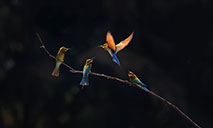Man devotes life to protecting Yunnan snub-nosed monkeys
Zhong Tai, former deputy head of the management administration of Baima Snow Mountain National Nature Reserve in Deqin county, southwest China’s Yunnan province, has devoted himself to protecting Yunnan snub-nosed monkeys, one of the world’s most endangered species, for 38 years.

Zhong Tai (3rd L) and other rangers eat while taking a rest during a patrol. (Photo/Yu Fengqin)
Zhong, who recently retired, was recruited as a staff member of the reserve’s Yeri protection station after graduating from middle school at the age of 17 in 1983 when the reserve was established. Yunnan snub-nosed monkeys are distinguished by their upturned noses, pink lips and big eyes, and are an endangered species unique to China under national first-class protection.
Back then, Zhong encountered various difficulties, such as poor transportation and a lack of electricity and office space. It was also much more difficult to catch sight of the Yunnan snub-nosed monkeys, as they live in alpine forests with an altitude of more than 3,000 meters and are rarely seen. However, Zhong always went to the mountains to look for the animals whenever he had time.
Fortunately, Zhong managed to see the Yunnan snub-nosed monkeys up close during a field investigation in June 1985, and trailed them for five days to observe them. He went on to publish a paper on the species’ habits.
Since then, Zhong and his colleagues, as well as researchers from the Kunming Institute of Zoology under the Chinese Academy of Sciences, have traversed about 20,000 square meters of mountains in the northwestern part of Yunnan province and found more Yunnan snub-nosed monkey groups, laying a solid foundation for the protection and research of the species.
In the past, hunting and logging damaged the habitats of the monkeys, posing threats to their survival. To solve this problem, Zhong began mobilizing surrounding residents to participate in conservation efforts in 1999, starting from Tongduishui villagers’ group in Shusong village, Benzilan township.
In the mountainous Tongduishui, which has scarce arable land resources and difficulty accessing drinking water, many villagers previously made a living through lumbering. Zhong brought in programs and funds and worked with villagers to improve the drinking water supply and build terraced fields, helping solve the villagers’ problems. Consequently, they no longer cut down trees and now volunteer to plant trees and patrol forests.
For more than 20 years, Zhong has dedicated himself to helping villagers near the reserve increase their incomes so as to mobilize them to join efforts to protect the monkeys.
Meanwhile, Zhong has become a forestry engineer and an expert on the Yunnan snub-nosed monkeys due to his unremitting devotion to their protection and research. He has published over 10 papers on the species at home and abroad.
Zhong began to take charge of the protection of the species in Xiangguqing village in 2008, when the monkeys there were found to be suffering from diarrhea and other experts failed to find a solution.
Drawing from local villagers’ experience, Zhong and his colleagues used sumac and pumpkin seeds to treat the diarrhea, a method that proved effective. At that time, Zhong lived in Xiangguqing and assigned specific rangers to take care of particular monkey groups. After years of conservation, the monkey population in Xiangguqing is now growing. Eleven Yunnan snub-nosed monkeys were born there so far this year. On top of that, the village is now the only place in China where people can observe the creatures up close. Now, researchers from several institutes and universities conduct research into the species in Xiangguqing.
Zhong’s long-term efforts and the joint efforts of the government, researchers and local villagers are now paying off. The groups and population of the Yunnan snub-nosed monkeys are constantly rising. So far, 23 groups have been identified, up from 13 in 1996. The total population of the animals also rose from between 1,000 and 1,500 to over 3,300 during the same period. Furthermore, Baima Snow Mountain National Nature Reserve is home to around 60 percent of the total population of Yunnan snub-nosed monkeys.
Photos
Related Stories
Copyright © 2021 People's Daily Online. All Rights Reserved.










